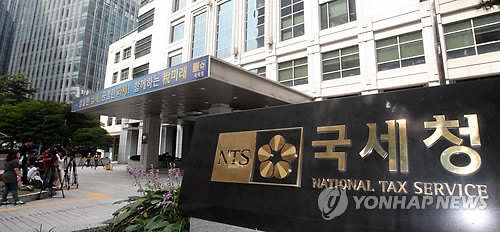South Korea's ratio of income tax revenue to gross domestic product has been rising at a fast pace over the past years due largely to the increased number of taxpayers, a report showed Monday.
The country's revenue from earned income and global income taxes came to 36.8 trillion won ($31.4 billion) in 2014, accounting for 2.48 percent of the overall tax revenue of 1,485.1 trillion won, according to the report based on data from the finance ministry and the National Tax Service.
 |
National Tax Service (Yonhap) |
Earned income taxes are paid mostly by wage workers, and global income taxes by those who run one-man operations.
The ratio, which stood at a mere 1.63 percent in 2004, rose to 2.15 percent in 2012, breaching the 2 percent mark for the first time, before surging to 2.3 percent in 2013.
The rise in the ratio means that the tax burden of wage earners and self-employed people has grown at a faster rate than that of the country's economic growth, said professor Seong Myung-jae, who authored the report and teaches economics at Hongik University in Seoul.
He said the increased tax burden stems mainly from two reasons: the increased number of taxpayers and a hike in real income resulting from the economy's steady growth.
"With the country's working population nearing a peak, the number of people who are obliged to pay taxes has been rising at a fast click recently," Seong said.
The number of South Korea's taxpayers surpassed the 20 million mark for the first time in 2010 before spiking to 22.05 million in 2014.
The economist also said the country's steady economic growth led to workers' real income, boosting their tax burden. Other factors include an increase in the highest income tax rate to 38 percent from 35 percent and government efforts to raise its tax base, he added.
The South Korean economy, Asia's fourth largest, expanded 3.3 percent in 2014 from the previous year, compared with a 2.9 percent on-year gain in 2013. The country's population stood at 50.42 million in 2014. (Yonhap)








